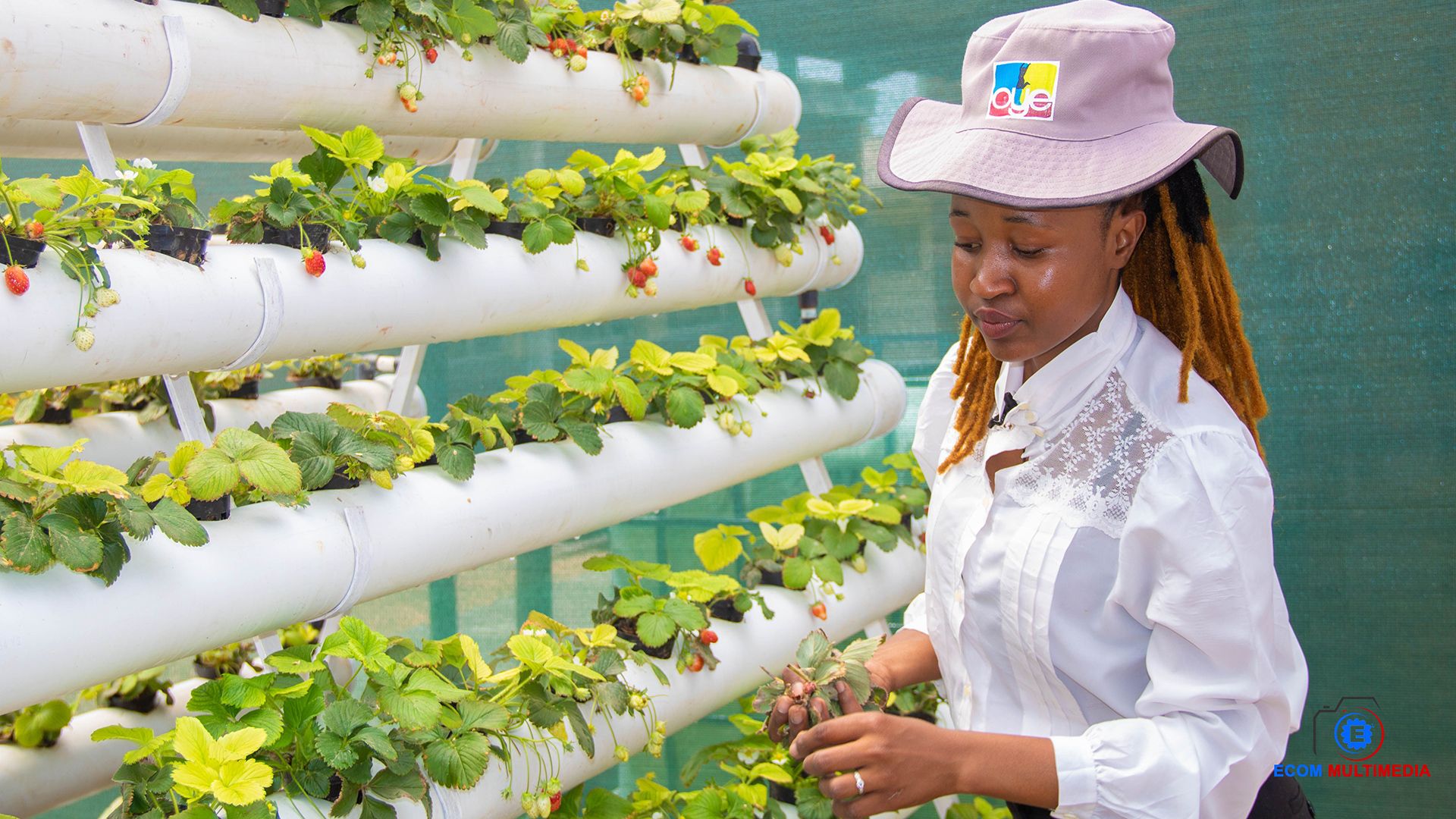A Resilient Champion of Urban Climate Sustainability
Ntombifikile Ncube’s journey from a passionate young farmer to a successful hydroponics entrepreneur showcases the impact of the OYE+ Scaling up Youth Employment in Agriculture Initiative. With training, mentorship, and financial support, she built a climate-resilient urban farm in Zimbabwe, promoting sustainable agriculture, food security, and youth empowerment.
AFS Newsletter - Article by
OYE+ Scaling up Youth Employment in Agriculture Initiative
The OYE+ Scaling up Youth Employment in Agriculture Initiative is a transformative project to empower 31,100 youth (aged 18-35 years) in Zambia and Zimbabwe. Phase 1 of the initiative ran from 2019 to 2023, supported by SDC and Sida, while Phase 2 extends from 2024 to 2028, with additional support from Irish Aid. This initiative builds on the Opportunities for Youth Employment (OYE) Product, implemented since 2013 and recently rebranded as Youth Employment and Entrepreneurship (YEE).
Ntombifikile Ncube’s journey from a young woman passionate about innovative farming to a successful hydroponics entrepreneur is a testament to the transformative potential of OYE programmes in Zimbabwe. Her story highlights the key approach through which SNV’s Youth Employment and Entrepreneurship programmes enable young entrepreneurs to succeed while also revealing the lessons learned, challenges, and limitations of such interventions for systemic change.
Comprehensive Training and Capacity Building
One of the foundational elements of SNV’s YEE framework is the provision of comprehensive training in technical and soft skills. Ntombifikile received training in Basic Life Skills and technical skills in horticulture, specializing in hydroponics farming. This training gave her the knowledge and tools to start and manage a sustainable agricultural enterprise.
Impact: The training enabled Ntombifikile to adopt innovative farming techniques, such as the nutrient film technique, which is particularly suited to urban environments with limited space. Her hydroponics farm now produces 500 strawberry and lettuce plants, contributing to food security in Bulawayo (Zimbabwe) while promoting efficient use of inputs like water and fertilizers.
Coaching, Mentorship and Peer Support
Coaching and mentorship are a critical component of SNV’s YEE framework, providing young entrepreneurs with guidance, encouragement, and practical advice from experienced peers and professionals. Ntombifikile benefited from mentorship support, which helped her navigate the challenges of starting and scaling her hydroponics business.
Impact: Peer Coaching and Mentorship played a key role in building Ntombifikile’s confidence and resilience. It gave her valuable insights into market dynamics, business management, and sustainable practices. Today, she actively mentors other young people interested in hydroponics, creating a ripple effect of knowledge sharing and empowerment.
Access to Finance and Matching Grants
Access to finance is one of the most significant barriers for young African entrepreneurs. SNV’s YEE programs address this challenge by facilitating access to grants, loans, and other financial resources. Ntombifikile received a $3,000 matching grant, which provided her with the capital needed to launch her hydroponics farm.
Impact: The matching grant enabled Ntombifikile to invest in essential infrastructure and inputs, such as hydroponics systems and seedlings. Her business now generates over $300 monthly, providing a stable income and creating employment opportunities for three other youths. Her efforts have been recognized internationally, earning her the bronze award for green business innovation at the SNV Global Forum 2023 in Accra, Ghana.
Market Linkages and Value Chain Integration
SNV’s YEE programs emphasize the importance of integrating young entrepreneurs into value chains and connecting them with markets. Ntombifikile’s hydroponics farm supplies fresh produce to markets in Bulawayo, and she has also started processing her strawberries into milkshakes, which fetch higher prices.
Impact: Market linkages have enabled Ntombifikile to diversify her income streams and increase her profitability. Her ability to adapt to market demands, such as adding value to her strawberries, demonstrates the importance of market-oriented approaches.
Promoting Climate Resilience and Environmental Sustainability
Ntombifikile’s hydroponics farm is a model of climate-resilient and environmentally sustainable agriculture. Hydroponics farming uses significantly less water and land than traditional farming methods, making it an ideal solution for urban environments and areas affected by climate change.
Impact: Ntombifikile’s farm contributes to climate resilience by promoting efficient resource use and reducing carbon footprints. Her success has also inspired other young people to adopt sustainable agricultural practices, creating a multiplier effect.
Ntombifikile Ncube’s success as a resilient Champion of urban climate sustainability is a powerful example of how SNV’s YEE programmes can enable young entrepreneurs to overcome systemic barriers and achieve sustainable success. Through comprehensive training, coaching, mentorship, access to finance, market linkages, and a focus on climate resilience, the YEE programme has empowered Ntombifikile to create a thriving hydroponics business that benefits her community and the environment. However, her story also underscores the broader lessons learned, challenges, and limitations of such interventions, including scalability issues, policy barriers, and the digital divide.
To fully realize the potential of young entrepreneurs like Ntombifikile, development organizations must adopt a holistic and collaborative approach that addresses these challenges. This includes advocating for favourable policies, investing in infrastructure and technology, and fostering partnerships with governments, private sector actors, and other stakeholders. By doing so, we can empower more young people to become Champions of climate sustainability and drive transformative change in the agri-food sector and beyond. Ntombifikile’s story is not just a testament to her resilience and innovation; it is a call to action for all of us to support the next generation of green entrepreneurs.


